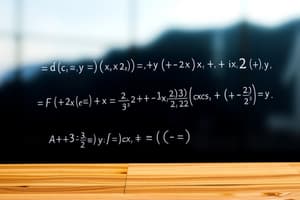Podcast
Questions and Answers
What is the limit of a constant c as x approaches a?
What is the limit of a constant c as x approaches a?
c
What is the limit of x as x approaches a?
What is the limit of x as x approaches a?
a
Which of the following statements about limits is true?
Which of the following statements about limits is true?
- lim cf(x) = ca
- lim (f(x) ± g(x)) = lim f(x) ± lim g(x)
- lim (f(x) × g(x)) = lim f(x) × lim g(x)
- All of the above (correct)
What is the limit of (g(x))^n as x approaches a?
What is the limit of (g(x))^n as x approaches a?
What is the limit of the square root of f(x) as x approaches a?
What is the limit of the square root of f(x) as x approaches a?
What is the nth root limit of f(x) as x approaches a?
What is the nth root limit of f(x) as x approaches a?
The limit of c times f(x) as x approaches a equals _____
The limit of c times f(x) as x approaches a equals _____
What can be concluded if lim g(x) equals a non-zero value?
What can be concluded if lim g(x) equals a non-zero value?
If lim p(x) = 3, what is the value of a?
If lim p(x) = 3, what is the value of a?
If lim N(x) = 5, what is the value of c?
If lim N(x) = 5, what is the value of c?
Flashcards are hidden until you start studying
Study Notes
Computation of Limits
- Limits of constants and variables:
- The limit of a constant is the constant itself.
- The limit of a variable is the value the variable is approaching.
- Rules for calculating limits involving functions:
- Multiplication with a constant: The limit of a constant multiplied by a function is equal to the constant multiplied by the limit of the function.
- Addition and subtraction: The limit of the sum or difference of two functions is equal to the sum or difference of their individual limits.
- Multiplication of functions: The limit of the product of two functions is equal to the product of their individual limits.
- Division of functions: The limit of the quotient of two functions is equal to the quotient of their individual limits, provided the limit of the denominator is not zero.
- Power of a function: The limit of a function raised to a power is equal to the limit of the function raised to that power.
- Radical functions: The limit of the square root of a function is equal to the square root of the limit of the function, provided the limit of the function is non-negative.
- Nth root of a function: The limit of the nth root of a function is equal to the nth root of the limit of the function, provided the limit of the function is non-negative and n is an even number.
- Finding limits using graphs:
- The limit of a function as x approaches a given value is the value the function approaches as x gets closer and closer to that value.
- Examine the graph of the function to see what value the function approaches as x gets closer to the point in question.
- Factorizing revision:
- Common factorizing: Finding the greatest common factor that can be extracted from each term of the expression.
- Difference of squares: This is a pattern where the difference of two squares can be factored as (a-b)(a+b).
- Difference of cubes: This is a pattern where the difference of two cubes can be factored as (a-b)(a² + ab + b²).
- Polynomials: Expressing a polynomial as a product of simpler polynomials or linear factors by finding the roots of the polynomial.
- Factoring by grouping: This method involves grouping terms in the expression and factoring out common factors to simplify the expression.
Studying That Suits You
Use AI to generate personalized quizzes and flashcards to suit your learning preferences.




